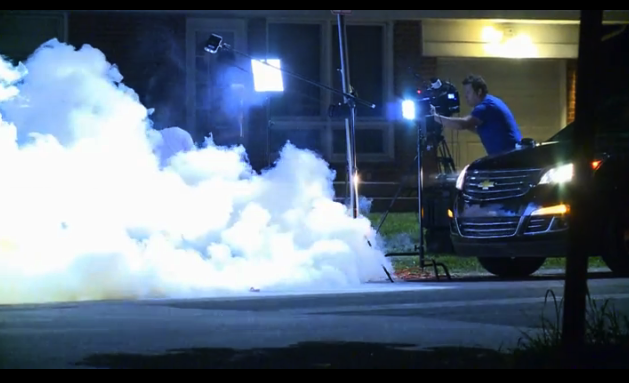The Police Can’t Order You To Stop Filming Them In Public, Or Force You To Delete Pics From Phone

An Al Jazeera TV crew being tear-gassed by authorities in Ferguson (via BoingBoing)
GigaOm’s Jeff John Roberts has a concise piece on the topic that anyone interested should read.
In 2011, the U.S. Court of Appeals for the First Circuit ruled [PDF] in the case of Glik v. Cunniffe that private citizens have the right to record public officials, including police, in a public place.
The court held that the First Amendment’s proscription on laws “abridging the freedom of speech, or of the press… encompasses a range of conduct related to the gathering and dissemination of information.”
The ruling cites an earlier Supreme Court pronouncement that people have the right to gather news “from any source by means within the law.”
“The filming of government officials engaged in their duties in a public place, including police officers performing their responsibilities, fits comfortably within these principles,” wrote the Appeals Court. “Gathering information about government officials in a form that can readily be disseminated to others serves a cardinal First Amendment interest in protecting and promoting ‘the free discussion of governmental affairs.'”
The Supremes had previously stated that “[f]reedom of expression has particular significance with respect to government because ‘[i]t is here that the state has a special incentive to repress opposition and often wields a more effective power of suppression.’”
And the First Circuit said this applies even more so to law enforcement officials, as they “are granted substantial discretion that may be misused to deprive individuals of their liberties.”
“Ensuring the public’s right to gather information about their officials not only aids in the uncovering of abuses but also may have a salutary effect on the functioning of government more generally,” wrote the court.
The Glik ruling also acknowledged limitations to citizens’ rights to record public officials.
“It may be subject to reasonable time, place, and manner restrictions,” the First Circuit explained. And though it did not specifically prescribe what those limitations might be, the court noted that “peaceful recording of an arrest in a public space that does not interfere with the police officers’ performance of their duties is not reasonably subject to limitation.”
The court explained that, much like police are expected to withstand verbal challenges from citizens without threatening arrest, this “same restraint demanded of law enforcement officers in the face of ‘provocative and challenging’ speech must be expected when they are merely the subject of videotaping that memorializes, without impairing, their work in public spaces.”
Regarding the question of whether or not police can tell you to delete photos from your phone, the recent Supreme Court rulings in Riley v. California and U.S. v. Wurie make it rather clear that they can not force you to do so.
In those cases, SCOTUS held that a warrant is needed to search a citizen’s phone, even if that citizen has been arrested. And since there is no way to tell if a photo has been taken — or what the content of a photo might be, or if it’s been deleted — without searching that phone, this tells us that an officer barking at you to “delete those photos!” can ask all that he or she wants, but it’s up to you whether or not you want to erase the images.
Want more consumer news? Visit our parent organization, Consumer Reports, for the latest on scams, recalls, and other consumer issues.

